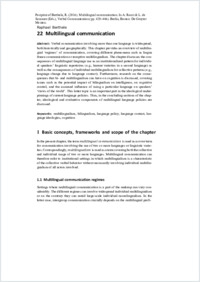Multilingual communication
BLE-BLL
- Berthele, Raphael Université de Fribourg
-
2016
Published in:
- Verbal Communication / Rocci, Andrea ; de Saussure, Louis. - De Gruyter Mouton. - 2016, p. 429-446
English
Verbal communication involving more than one language is widespread, both historically and geographically. This chapter provides an overview of multilingual ‘regimes’ of communication, covering different phenomena such as lingua franca communication or receptive multilingualism. The chapter discusses the consequences of multilingual language use as an institutionalized pattern for individual speakers’ linguistic repertoires (e.g., learner varieties in a second language) as well as the consequences of individual multilingualism for collective patterns (e.g., language change due to language contact). Furthermore, research on the consequences that bi- and multilingualism can have on cognition is discussed, covering issues such as the potential impact of bilingualism on intelligence, on cognitive control, and the assumed influence of using a particular language on speakers’ ‘views of the world’. This latter topic is an important part in the ideological underpinnings of current language policies. Thus, in the concluding sections of the chapter, ideological and evaluative components of multilingual language policies are discussed.
- Faculty
- Faculté des lettres et des sciences humaines
- Department
- Département de plurilinguisme et didactique des langues étrangères
- Language
-
- English
- Classification
- Language, linguistics
- License
-
License undefined
- Identifiers
-
- RERO DOC 327113
- DOI 10.1515/9783110255478-023
- Persistent URL
- https://folia.unifr.ch/unifr/documents/308286
Statistics
Document views: 187
File downloads:
- Texte intégral: 499
